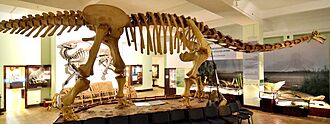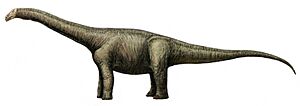Opisthocoelicaudia facts for kids
Quick facts for kids Opisthocoelicaudia |
|
|---|---|
 |
|
| Skeleton restoration in the Museum of Evolution of Polish Academy of Sciences, Warsaw | |
| Scientific classification |
|
| Kingdom: | Animalia |
| Phylum: | Chordata |
| Clade: | Dinosauria |
| Clade: | Saurischia |
| Suborder: | †Sauropodomorpha |
| Clade: | †Sauropoda |
| Clade: | †Titanosauria |
| Clade: | †Lithostrotia |
| Family: | †Saltasauridae |
| Genus: | †Opisthocoelicaudia Borsuk-Białynicka, 1977 |
| Species: |
†O. skarzynskii
|
| Binomial name | |
| †Opisthocoelicaudia skarzynskii Borsuk-Białynicka, 1977
|
|
| Script error: The function "autoWithCaption" does not exist. | |
Script error: No such module "Check for conflicting parameters".
Opisthocoelicaudia is a type of dinosaur called a titanosaur sauropod. These were huge, long-necked dinosaurs. Opisthocoelicaudia lived during the Late Cretaceous period. This was about 70 million years ago. Its fossils were found in Mongolia, in a place called the Nemegt Basin. In 1965, scientists found a nearly complete skeleton. It was missing only its neck and head.
Contents
About Opisthocoelicaudia
Opisthocoelicaudia means "posterior hollow tail". This name comes from its unique tail bones. The front part of its tail bones were hollowed out. This is a special feature that helps scientists identify it.
This dinosaur was a herbivore, meaning it ate plants. Like other sauropods, it likely had a long neck to reach tall leaves. Its body was very large and heavy.
Discovery and Location
The first skeleton of Opisthocoelicaudia was found in 1965. It was discovered during a Polish-Mongolian expedition. The fossil site was in the Nemegt Basin of Mongolia. This area is famous for many dinosaur discoveries.
The skeleton was very well preserved. It gave scientists a lot of information. Only the head and neck bones were missing. This made it a very important find.
Is it the same as Nemegtosaurus?
Scientists sometimes debate if two different dinosaur names are actually the same animal. This is the case with Opisthocoelicaudia and another dinosaur called Nemegtosaurus.
Some scientists think Nemegtosaurus might be the same as Opisthocoelicaudia. This is because Nemegtosaurus is mostly known from a skull. Opisthocoelicaudia is known from a body without a skull. If the skull of Nemegtosaurus fits the body of Opisthocoelicaudia, they could be the same. This debate is still ongoing among paleontologists.
Images for kids
-
Mounted holotype specimen
-
A cast of the skull of Nemegtosaurus on an Opisthocoelicaudia skeleton. This shows how they might fit together.
See also
 In Spanish: Opisthocoelicaudia skarzynskii para niños
In Spanish: Opisthocoelicaudia skarzynskii para niños
 | DeHart Hubbard |
 | Wilma Rudolph |
 | Jesse Owens |
 | Jackie Joyner-Kersee |
 | Major Taylor |











